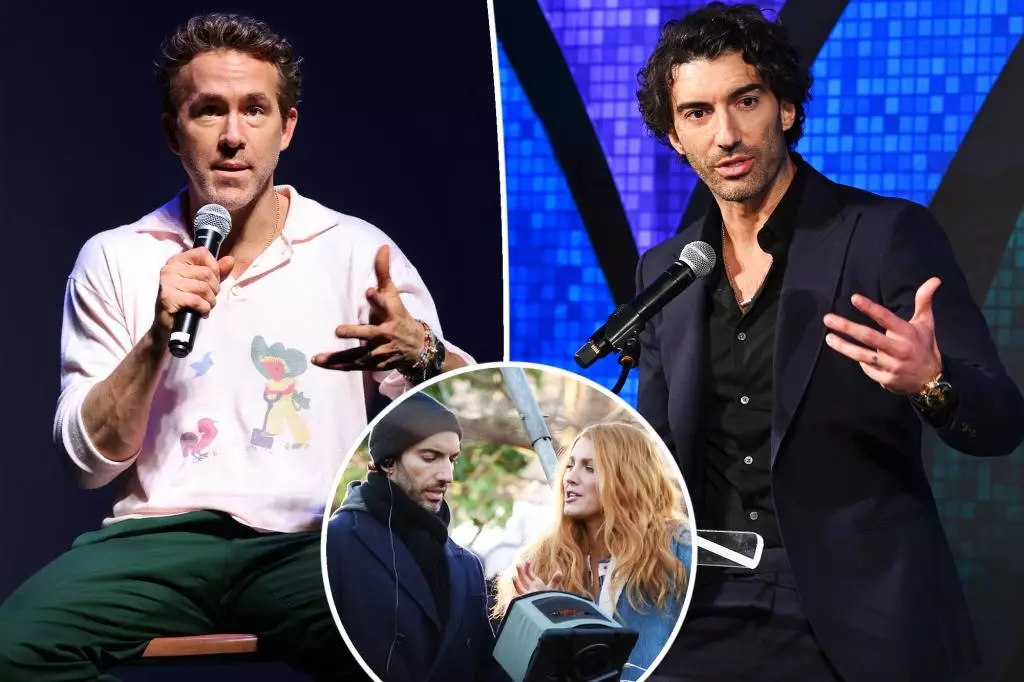In the glimmering yet often treacherous world of Hollywood, personal relationships intertwine with professional dynamics, creating a complex web that sometimes leads to drama, misunderstandings, and even allegations of misconduct. A recent incident involving Ryan Reynolds, Justin Baldoni, and Blake Lively has shed light on these intricate relationships, unveiling issues of social media behavior, workplace harassment claims, and public perception. This article unpacks the unfolding narrative, delving into the implications behind their social media interactions and the serious allegations at play, ultimately reflecting on the significance of accountability in the industry.
The initial spark of controversy ignited when Justin Baldoni discovered that Ryan Reynolds had blocked him and his production company on Instagram. This action occurred amidst the pre-release buzz surrounding their film, “It Ends With Us.” Interestingly, Baldoni’s apprehension regarding Lively’s potential response to the block reveals a notable tension within their working relationship. His text message, suggesting the need for a strategic plan should Lively reciprocate the block, speaks volumes about his anxiety and anticipation concerning the upcoming release. This situation raises pertinent questions about the perils of social media behavior among celebrities; a simple block can reflect deeper personal dynamics that filter into the professional realm.
Beyond the apparent immaturity of social media antics, this minor online conflict serves as a metaphor for larger issues prevalent in Hollywood today: how personal disputes can quickly escalate and publicly manifest, influenced by the power of social media. In an age where personal interactions are often scrutinized, the implications of such actions can reverberate beyond a simple unfollow, becoming fodder for gossip and speculation.
As the narrative continued to unfold, Blake Lively’s recent sexual harassment complaint against Baldoni took center stage, significantly overshadowing the initial social media dispute. According to the accusation, Baldoni exhibited behavior that Lively deemed disturbing and inappropriate during the filming process, leading her to call an “all-hands” meeting to set clear boundaries for their working relationship. Allegations of inappropriate discussions, including explicit content and personal inquiries, are both shocking and concerning, especially in an industry striving for safer work environments.
Lively’s determination to call attention to these matters highlights the ongoing necessity for open discussions about harassment in Hollywood. By setting expectations and clearly articulating her discomfort, she not only seeks to protect herself but also hopes to foster a safer atmosphere for others in the industry. This action reflects a growing movement among celebrities to voice their experiences and enact change, bringing to light behaviors that have long been tolerated in silence.
In response to Lively’s accusations, Baldoni has labeled the allegations as “categorically false,” an assertion made by his attorney, who denounced the claims as outrageous and intended to harm his public image. This defensive stance speaks to the systemic issue within the entertainment industry where allegations often lead to public relations crises. The assertion from Baldoni’s camp that Lively had made several demands during filming adds another layer of complexity to the unfolding situation, suggesting that there may be conflicts beyond individual interactions contributing to this alleged misconduct.
Such disputes are reminiscent of broader industry challenges, where the intersection of artistic expression and personal boundaries can become murky. In this case, not only does it underscore the need for respectful engagement on set, but it also highlights the requirement for clear communication and mutual understanding when navigating professional relationships.
The unfolding saga between Ryan Reynolds, Justin Baldoni, and Blake Lively serves as a crucial reminder of the responsibilities that come with celebrity status. As conversations around workplace dynamics and accountability grow, it becomes imperative for industry practitioners to reflect on their conduct and the potential ramifications of their actions, both online and offline. The dialogues initiated through these incidents are vital for fostering a more respectful and safe working environment, granting individuals the opportunity to voice their concerns without fear of retaliation.
While the glimmer of Hollywood may dazzle, it is the shadows of interpersonal relationships that often cast a concerning light on the industry’s underlying issues. As this situation continues to develop, the hope is for a future where such allegations are not merely headlines but catalysts for lasting change and accountability in Hollywood.

Leave a Reply